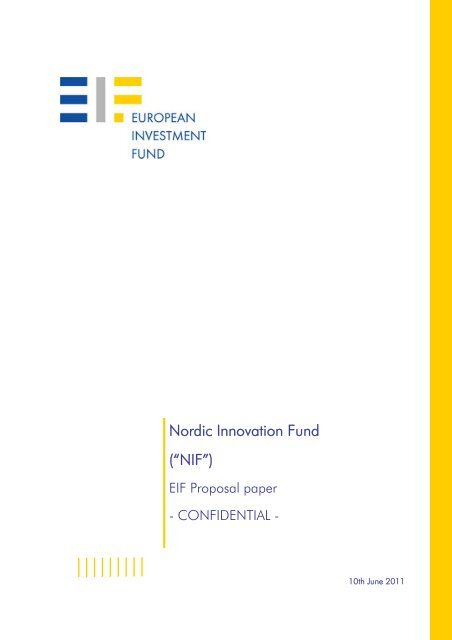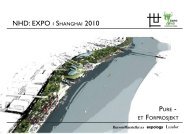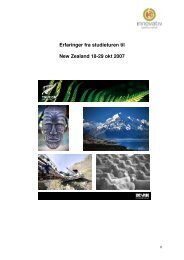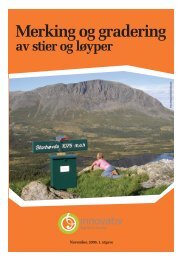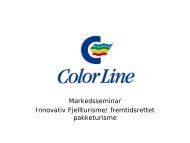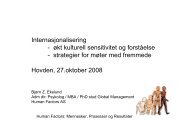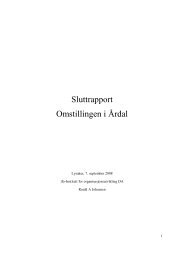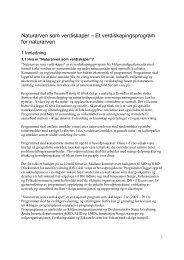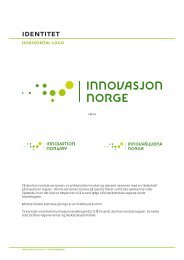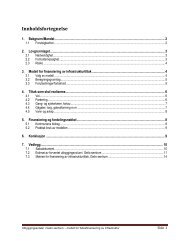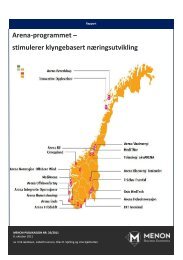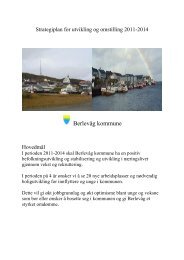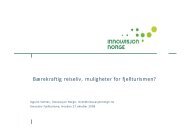Nordic Innovation Fund (“NIF”)
Nordic Innovation Fund (“NIF”)
Nordic Innovation Fund (“NIF”)
You also want an ePaper? Increase the reach of your titles
YUMPU automatically turns print PDFs into web optimized ePapers that Google loves.
<strong>Nordic</strong> <strong>Innovation</strong> <strong>Fund</strong><br />
(<strong>“NIF”</strong>)<br />
EIF Proposal paper<br />
- CONFIDENTIAL -<br />
10th June 2011
Table of contents<br />
Executive Summary.....................................................................................1<br />
Introduction...............................................................................................3<br />
<strong>Nordic</strong> <strong>Innovation</strong> Position Statement ...........................................................5<br />
The European Investment <strong>Fund</strong> (EIF).............................................................6<br />
Investment strategy .....................................................................................7<br />
Proposed fund structure & Governance ......................................................10<br />
Terms and Conditions...............................................................................10<br />
<strong>Fund</strong> operation ........................................................................................11<br />
The Management team & Investment record ...............................................12<br />
Financial projections ................................................................................13<br />
Proposed Next Steps.................................................................................14<br />
Contacts .................................................................................................14<br />
Annex 1: Diagram of the <strong>Nordic</strong> <strong>Innovation</strong> <strong>Fund</strong>........................................15<br />
Annex 2: List of Involved Parties.................................................................16
The <strong>Nordic</strong> <strong>Innovation</strong> <strong>Fund</strong> (NIF)<br />
Executive Summary<br />
The <strong>Nordic</strong> <strong>Innovation</strong> <strong>Fund</strong> will be a EUR 250m Investment <strong>Fund</strong> creating equity investment activities to<br />
develop a well-functioning <strong>Nordic</strong> early-stage equity market. The <strong>Fund</strong> will support innovative start-up and<br />
growth companies across the five <strong>Nordic</strong> countries, implemented through a coordinated structure advised by<br />
the European Investment <strong>Fund</strong>.<br />
Main characteristics of the <strong>Nordic</strong> <strong>Innovation</strong> <strong>Fund</strong> (NIF)<br />
• An initial target of EUR 250m financed by 50% from commitments from the five <strong>Nordic</strong> Governments<br />
(totalling EUR 125m) with 33% from European Investment <strong>Fund</strong> (EIF) capital resources and the<br />
remaining 17% expected to be raised from private investors including corporates and pension funds.<br />
• NIF will be managed and invested on a commercial basis with EIF acting as both investor and<br />
advisor. Full pari passu treatment for all investors.<br />
• Structure to provide governance, efficiency and speed: with first closing before end 2011 allowing<br />
investments to begin in Q1 2012 to address the growing market needs as soon as possible, but with<br />
Government commitments drawn down only from 2012 onwards.<br />
• Investments to be focussed upon strengthening the <strong>Nordic</strong> regions competitive advantages in<br />
Cleantech, ICT/Mobile and Life Science sectors.<br />
• The level of investment into enterprises in each country will equal at least the respective government’s<br />
capital commitment to NIF.<br />
• Take full advantage of EIF investment experience and track record as a fund of funds manager in the<br />
target sectors in the creation of an agreed set of investment activities.<br />
Main Benefits from establishing an all-<strong>Nordic</strong> proposal<br />
• The <strong>Nordic</strong> region has a well-established reputation for innovation and a mature equity market<br />
infrastructure but operating separately each market struggles to maximise returns and therefore fails<br />
to attract the interest of international investors.<br />
• The upturn in the economic cycle and the comparative advantage that the <strong>Nordic</strong> region has in key<br />
sectors such as ‘Green growth’ presents a significant investment window of opportunity to create long<br />
term market impact and achieve positive investment results.<br />
• By combining government support with EIF human and capital resources, the initiative is expected to<br />
attract strong interest from corporates seeking to source innovation from the wider <strong>Nordic</strong> region as<br />
part of the ‘open-innovation’ approach.<br />
• The <strong>Nordic</strong> region has a long history of collaboration and combined structures that can be leveraged<br />
by a disciplined and deliberately pan-<strong>Nordic</strong> approach which will ensure the commercial viability of<br />
the NIF whilst deliberately targeting the policy objectives of:<br />
o building a competitive and sustainable <strong>Nordic</strong> ecosystem for innovation and<br />
o<br />
entrepreneurship<br />
supporting the growth of existing <strong>Nordic</strong> technology SMEs and financing the start-up process<br />
of new innovative and technology SMEs in the <strong>Nordic</strong> countries;<br />
o contributing to strengthen the <strong>Nordic</strong> venture capital infrastructure by enhancing interest and<br />
leveraging investment activity of private and non-institutional investors such as family offices<br />
and business angels; and<br />
o supporting cross-border investments to foster an integrated <strong>Nordic</strong> market.<br />
• As shown under the Policy Objectives section, each country has specific needs that will be addressed<br />
within the context of wider <strong>Nordic</strong> collaboration and EIF facilitation delivering specific benefits to all<br />
involved countries.<br />
1
Focus/strategy/performance<br />
• NIF will have a structured toolbox of investment products designed to meet the overall <strong>Nordic</strong> and<br />
individual market needs and maximise private investment on a fully commercial basis.<br />
• A main focus will be on <strong>Nordic</strong> VC Managers investing in early and growth stage SMEs in<br />
ICT/Mobile, Life Sciences and Cleantech areas.<br />
• An additional element will include a ‘Co-Investment Window’ designed to invest with the growing and<br />
important Business Angel and Family Office communities.<br />
• Furthermore, a specific emphasis will be given to boosting the commercialisation of technology<br />
innovation created from University and Research Institutions through the use of the Technology<br />
Transfer Accelerator process.<br />
• Strict selection criteria and a portfolio approach will be used to ensure an attractive risk profile of NIF<br />
resulting in strong performance expectation and a risk-commensurate return for investors.<br />
EIF resources and track record<br />
• EIF has a high quality team with a unique collective investment record, strong experience and insight<br />
into the <strong>Nordic</strong> markets based on an acknowledged pre- and post-investment hands-on approach.<br />
• Unique market experience in the <strong>Nordic</strong> Region: since 1998 EIF has invested under different<br />
mandates and with own resources over EUR 660m in more than 43 funds based across the region.<br />
• Through these commitments, EIF has taken an active approach towards the development of the local<br />
VC market by supporting emerging teams and setting up tailor made technology transfer vehicles.<br />
• EIF lives up to the highest professional standards and integrity, and has its own unique in-house back<br />
office, risk management, legal and compliance support functions all involved in the decision process.<br />
• Competitive track record in the geography, stage and sector.<br />
Combine market development goals and financial objectives<br />
• EIF has considerable experience in setting up and successfully managing tailored <strong>Fund</strong>-of-<strong>Fund</strong>s<br />
schemes for European Member States, Regions and strategic investors fulfilling the combination of<br />
policy and financial objectives and commercial principles.<br />
• EIF will seek to optimise market development and maximise leverage of the investment by the <strong>Nordic</strong><br />
Governments by targeting the support of <strong>Fund</strong> Managers focused on the <strong>Nordic</strong>s through cornerstone<br />
positions and boosting interest from private sector investors at the fund manager level through EIF’s<br />
recognised catalytic function.<br />
• EIF already possesses a clearly established pipeline of Venture Capital funds covering the target<br />
sectors and development stages to ensure risk-adequate diversification for the NIF portfolio.<br />
“In light of market needs and opportunities, EIF is committed to further increasing its activity in the <strong>Nordic</strong><br />
region to build a sustainable and truly <strong>Nordic</strong> VC ecosystem to support entrepreneurship and innovation. We<br />
are ready to commit our capital and experience to catalyse a process of attracting private investors to invest<br />
alongside public funds to create a solution for the long-term benefit of the entire region.”<br />
Richard Pelly<br />
Chief Executive<br />
European Investment <strong>Fund</strong><br />
2
Introduction<br />
During the last few years, the EIF has been<br />
working closely with the <strong>Nordic</strong> <strong>Innovation</strong> to<br />
explore the needs of the marketplace and<br />
consider possible actions. In November 2009,<br />
a joint proposal was issued seeking to<br />
establish a ‘<strong>Nordic</strong> Baltic Investment <strong>Fund</strong>’.<br />
Since then, further work and deteriorating<br />
market conditions have forced the need to<br />
enhance and improve the original proposal.<br />
EIF, with the ongoing support of the <strong>Nordic</strong><br />
<strong>Innovation</strong>, now submits this revised proposal<br />
for the consideration by all five <strong>Nordic</strong><br />
Governments.<br />
The proposal has been created following<br />
detailed discussions with public agencies,<br />
market players and ministry officials during the<br />
course of 2011 1 and reflect the strongly held<br />
view that further intervention and support is<br />
needed. Since the Credit Crisis beginning in<br />
late 2008, there have been a number of<br />
negative repercussions on the equity market<br />
across the region that now must be addressed.<br />
More specifically, the withdrawal of certain<br />
pension fund managers; the closure of existing<br />
VC funds; the inability to attract private<br />
investors and the fear that the <strong>Nordic</strong> region’s<br />
competitive advantages are not being fully<br />
maximised, are all factors driving the need for<br />
action.<br />
As a result, EIF proposes to create an<br />
Investment vehicle to be named the ‘<strong>Nordic</strong><br />
<strong>Innovation</strong> <strong>Fund</strong>’ for an initial target of EUR<br />
250m.<br />
Policy Objectives<br />
This proposal seeks to combine the benefits of<br />
adopting an all-<strong>Nordic</strong> approach whilst also<br />
addressing the specific policy objectives for<br />
each involved country.<br />
Main Benefits to Sweden<br />
• Address the specific lack of a national<br />
<strong>Fund</strong> of <strong>Fund</strong> initiative as highlighted as a<br />
market deficiency by the Swedish Venture<br />
Capital Association and entrepreneurs.<br />
• Build a coordinated implementation<br />
process to ensure the drive for efficient<br />
usage of public funds whilst maximising the<br />
level of participation from private and<br />
international investors.<br />
1 The full list of entities that have been involved in<br />
the preparatory discussions is shown in Annex 2.<br />
• To counterbalance the recent exits from<br />
<strong>Fund</strong> Managers and Pension <strong>Fund</strong>s from<br />
this key growth-creating activity.<br />
Main Benefits to Norway<br />
• Complement existing and new Norwegian<br />
public seed initiatives by strengthening the<br />
market for private follow-on investments, in<br />
order to accelerate company growth and<br />
increase the returns on national seed<br />
investments.<br />
• Counteract the problem of ‘talent loss’<br />
resulting from the withdrawal of private<br />
investors in the early stages, by backing<br />
experienced and emerging fund<br />
management teams.<br />
• Act as a co-investor alongside Argentum to<br />
utilize the full potential for high growth and<br />
internationalisation of Norwegian<br />
companies.<br />
Main Benefits to Finland<br />
• Provide greater investment strength to help<br />
realize the full potential of the ”<strong>Innovation</strong><br />
Economy” of Finland by acting as a coinvestor<br />
alongside Finnish Industry<br />
Investment.<br />
• Provide specific growth stage investments<br />
and support to competent fund managers<br />
in order to address the issue of decreasing<br />
follow-on investment, thereby increasing<br />
returns on the wide array of Finnish Seed<br />
Investment programs.<br />
• Improve the track record of<br />
commercialisation from Finland’s<br />
universities and research institutions.<br />
Main Benefits to Denmark<br />
• Provide investment activities to enable<br />
greater internationalisation of Denmark’s<br />
growth-orientated companies.<br />
• Create a vehicle that can co-invest<br />
alongside Vaekstfonden and the new<br />
Danish Growth Capital <strong>Fund</strong> (Dansk<br />
VaekstKapital K/S).<br />
• Improve the access to finance for Danish<br />
SMEs by increasing the availability of<br />
alternative sources of capital.<br />
Main Benefits to Iceland<br />
• Enable Iceland to benefit from greater<br />
inflows of international investment.<br />
3
• Specifically create transactions of a coinvestment<br />
nature to further grow the startup<br />
sector within Iceland.<br />
• Maximise the integration and knowledge<br />
transfer to the Iceland market from being a<br />
core part of <strong>Nordic</strong> development process.<br />
Financing and Leverage<br />
The financing is proposed as follows:-<br />
• Upto 33% of the target EUR 250m to be<br />
investment from EIF subject to Board<br />
approval;<br />
• 17% (approx EUR 42.5m) to be invested<br />
by private sector investors such as<br />
corporates and pension funds;<br />
• EUR 125m to be invested by the five<br />
<strong>Nordic</strong> Governments could be split upon<br />
the established formula for <strong>Nordic</strong><br />
cooperation:o<br />
Sweden 31% (EUR 38.75m)<br />
o Norway 29% (EUR 36.25m)<br />
o Denmark 21.4% (EUR 26.75m)<br />
o Finland 17.5% (EUR 21.75m)<br />
o Iceland 1.1% (EUR 1.375m)<br />
Alternative funding scenarios could be<br />
envisaged depending upon input from all<br />
potential stakeholders.<br />
Such an investment is expected to attract<br />
capital at a number of levels which and as<br />
such leverage a total volume of around EUR 1<br />
billion invested in technology SMEs across the<br />
<strong>Nordic</strong> Region.<br />
Having already successfully established<br />
financing schemes targeting the VC fund<br />
industry in the past, EIF expects that full<br />
collaboration with the involved Ministries will<br />
lead to a significant impact of the NIF and thus<br />
to further strengthen the Equity sector as a<br />
whole.<br />
Graphically, the NIF can be best illustrated by<br />
this chart which is further explained in the<br />
section entitled ‘Proposed <strong>Fund</strong> Structure’. All<br />
amounts shown are illustrative.<br />
<strong>Nordic</strong> <strong>Innovation</strong> <strong>Fund</strong><br />
<strong>Nordic</strong> Region<br />
national contributions<br />
Upto 50%<br />
EUR 125m in total<br />
VC <strong>Fund</strong> of <strong>Fund</strong>s<br />
Window<br />
€180m<br />
ICT/Mobile<br />
Life Sciences<br />
Cleantech<br />
<strong>Nordic</strong> <strong>Innovation</strong> <strong>Fund</strong><br />
€250m<br />
Business Angel<br />
Co-investment<br />
facility<br />
€50m<br />
EIF contribution<br />
Upto 33%<br />
(EUR 82.5m)<br />
Private<br />
Sector<br />
EUR<br />
42.5m<br />
Technology<br />
Transfer<br />
Accelerator<br />
€20m<br />
High growth potential SME Community across the <strong>Nordic</strong>r egion<br />
This document neither contains legally-binding<br />
obligations of EIF or any other party nor does<br />
its content prejudice any future discussions and<br />
negotiations between EIF or any other party<br />
involved in the framework of a possible NIF<br />
structure. Any participation of EIF in such a<br />
structure (be it as investor, manager or<br />
otherwise) requires in any case the agreement<br />
of EIF’s board of directors. Any information<br />
stated in this document is therefore subject to<br />
further discussions and negotiations and<br />
conditionally to the economic and legal<br />
structure of the NIF vehicle.<br />
4
<strong>Nordic</strong> <strong>Innovation</strong> Position Statement<br />
The <strong>Nordic</strong> countries are by themselves relatively small economies, but combined constitute the world’s 10 th<br />
largest economy. This makes the <strong>Nordic</strong> region significant in the global economy. All the <strong>Nordic</strong> countries<br />
have strongholds within entrepreneurship, technology and innovation. Yet, they all struggle to develop new<br />
high growth companies competing on the global market. Various national support schemes are in place, but<br />
can be further enhanced through <strong>Nordic</strong> collaboration, particularly by developing a well functioning market<br />
for SME financing.<br />
Access to risk financing is a necessity for <strong>Nordic</strong> SMEs to grow and compete internationally. Hence, well<br />
functioning seed and venture capital markets in all stages of company developments are crucial for the<br />
innovativeness and competitiveness of the <strong>Nordic</strong> region. This has been acknowledged and emphasized by<br />
<strong>Nordic</strong> governments in the current as well as the previous <strong>Nordic</strong> Co-operation Programs for <strong>Innovation</strong> and<br />
Business Policy.<br />
<strong>Nordic</strong> <strong>Innovation</strong> (previously <strong>Nordic</strong> <strong>Innovation</strong> Centre) orchestrates the <strong>Nordic</strong> efforts to improve the critical<br />
state of the venture capital market and the access to funding for high growth <strong>Nordic</strong> SMEs. Through dialogue<br />
with key stakeholders and continuous monitoring of the state of the <strong>Nordic</strong> risk capital markets, we have<br />
identified a need to strengthen early growth investments in the <strong>Nordic</strong> region.<br />
Although the <strong>Nordic</strong> countries have mature venture markets, there are several critical market issues that need<br />
to be addressed. The majority of private investment funds have had a change of focus and are now primarily<br />
investing in later stages of companies’ life cycles. As a consequence there have become fewer funds investing<br />
in the early growth stages. There are well structured national programs providing seed funding for promising<br />
start-ups. But there is an urgent lack of funding for companies about to enter the market or expand<br />
internationally. We see fewer investments made in this critical growth phase. This means that a generation of<br />
promising <strong>Nordic</strong> growth companies is at risk.<br />
While the private venture capital funds in the <strong>Nordic</strong>s to a large extent operate pan-<strong>Nordic</strong>, the public funds<br />
are mainly operating within the national borders. Small national markets make it difficult to develop strong,<br />
specialized funds with large enough deal flow (i.e. investible companies) and good returns. Moreover, each<br />
national market is often too small to attract interest from international investors. Therefore public and private<br />
funds actively investing in each national market has to carry a substantial risk, since there are few co-investors.<br />
The <strong>Nordic</strong> <strong>Innovation</strong> <strong>Fund</strong> (NIF) proposal is a result of a thorough <strong>Nordic</strong> market analysis and dialogue with<br />
public and private stakeholders. NIF intend to alleviate critical market problems in the <strong>Nordic</strong> region by<br />
interacting and co-investing with national and international investors. NIF will attract more international<br />
capital to the region and will catalyze increased returns on national funding initiatives. Through various tools,<br />
the NIF will indirectly, and in cooperation with existing investors, provide new funding to a large number of<br />
<strong>Nordic</strong> SMEs, and it is expected to have a substantial impact on the future competitiveness of the region.<br />
“<strong>Nordic</strong> <strong>Innovation</strong> sees this initiative as highly relevant and timely, and as a window of opportunity for the<br />
<strong>Nordic</strong> countries to take common action for the benefit of each country and the entire region.”<br />
Ivar H. Kristensen, Managing Director, <strong>Nordic</strong> <strong>Innovation</strong><br />
5
The European Investment <strong>Fund</strong> (EIF)<br />
The EIF is unique amongst European<br />
institutions. It was set up in 1994 by both<br />
public and private sector shareholders, with a<br />
core objective to earn an appropriate return,<br />
alongside its goal to contribute to the pursuit of<br />
Community objectives. Since then, EIF has<br />
become a major investor in the European<br />
venture capital market.<br />
EIF has as its vision to be a pioneer in building<br />
risk finance markets for entrepreneurship and<br />
innovation. It indirectly supports SMEs by<br />
means of equity (venture capital and private<br />
equity funds) and guarantee instruments. EIF<br />
has over EUR 15bn of funds under<br />
management. Its main shareholder is the<br />
European Investment Bank (EIB) with 61%, and<br />
the remaining shares are held by the European<br />
Community with 29% and 9% by public or<br />
private banks and financial institutions (30 from<br />
17 countries).<br />
EIF invests either its own funds or those made<br />
available by third parties through specific<br />
mandates. These mandates include those<br />
EIF has invested over EUR 660m in 43 funds<br />
across the <strong>Nordic</strong> Region since 1998<br />
EIF benefits from AAA-ratings from the three major rating agencies<br />
granted by the EIB, the European Community<br />
(Competitiveness and <strong>Innovation</strong> Framework<br />
Programme or CIP), EU Member States and<br />
Regions and other third parties including<br />
private sector investors. As a result for equity,<br />
EIF has currently more than EUR 5.4 billion<br />
under management.<br />
EIF has already gained specific experience<br />
acting as a manager and advisor in respect of<br />
fund of funds, notably the ERP-EIF and LfA-EIF<br />
FoFs for Germany, UK FTF in the UK, Neotec<br />
in Spain, the Istanbul Venture Capital Initiative<br />
in Turkey, the Portugal Venture Capital Initiative<br />
in Portugal, Dahlia (pan-European) and<br />
GEEREF (renewable energy and energy<br />
efficiency funds in emerging markets). The total<br />
sum of these type of <strong>Fund</strong>s managed by EIF<br />
now equals EUR 1.735 billion.<br />
In total EIF manages investments in over 350<br />
funds across technology transfer, venture<br />
capital and the lower mid-market.<br />
Example investments made by EIF<br />
since 1998 in <strong>Nordic</strong> Region<br />
Venture Capital<br />
Conor Technology <strong>Fund</strong><br />
Aboa Venture<br />
Creandum<br />
Growhow Rahasto<br />
<strong>Nordic</strong> Biotech<br />
HealthCap VI<br />
InnKap<br />
Inveni Secondaries <strong>Fund</strong><br />
NorthZone<br />
<strong>Nordic</strong> Venture Partners<br />
IT Provider <strong>Fund</strong><br />
Inventure <strong>Fund</strong> Ky<br />
Swedestart<br />
Symbion Capital<br />
Growth Capital<br />
Accent Equity<br />
Armada Mezzanine <strong>Fund</strong><br />
CapMan Equity<br />
Eqvitec Technology <strong>Fund</strong><br />
Finnmezzanine <strong>Fund</strong><br />
Karnell <strong>Fund</strong><br />
Odin Equity Partners <strong>Fund</strong><br />
PMI Venture <strong>Fund</strong><br />
Litorina Kapital<br />
Sentica Buyout <strong>Fund</strong><br />
Priveq Investments<br />
Scope Growth<br />
Early Stage<br />
Chalmers <strong>Innovation</strong> <strong>Fund</strong><br />
Karolinska Development Co-<br />
Investment <strong>Fund</strong><br />
Moody’s rates EIF Aaa:<br />
“This rating is based on EIF’s multilateral development bank (MDB) status and the support of its highly-rated<br />
shareholders as partly reflected in its solid capital base. EIF’s Aaa rating also reflects its strong governance<br />
and the high quality of its management team and – in response to the global financial crisis - its further<br />
sophisticated and intensified system of risk management, monitoring and recovery systems.”<br />
6
Investment strategy<br />
Turning challenges into<br />
opportunities<br />
Bridging the equity gap for technology transfer,<br />
seed/start-up and early to growth stage technology<br />
companies is considered as one of the major<br />
challenges for fostering innovation and<br />
entrepreneurship. The NIF will focus on enhancing<br />
the availability of equity financing for innovative<br />
early and growth stage companies based in the<br />
<strong>Nordic</strong> countries.<br />
This can be expected to considerably increase the<br />
number of start-up and early to development stage<br />
innovative technology companies in the <strong>Nordic</strong><br />
countries and enhance their development prospects<br />
on the medium to long term.<br />
Compared to the European average, the <strong>Nordic</strong> VC<br />
sector is relatively mature and well developed, albeit<br />
with some national and regional differences.<br />
However, despite the maturity of the <strong>Nordic</strong> VC<br />
sector, VC investments have failed to provide risk<br />
commensurate returns to investors in recent years.<br />
This has led to many fund managers moving out of<br />
business or towards the later stage, which, as a<br />
result, is accentuating the need for early stage<br />
financing.<br />
The comparatively high national and corporate R&D<br />
budgets in the <strong>Nordic</strong> countries provide for a<br />
favourable environment for innovation and<br />
technology transfer to take place. In fact, the<br />
technology transfer infrastructure is relatively well<br />
developed in the region although the challenge to<br />
fund and grow the spin-offs and start-ups into<br />
mature and successful companies remains.<br />
The growing entrepreneurial spirit and hence the<br />
larger number of serial entrepreneurs, can be<br />
expected to lead to a pool of investment<br />
opportunities in the future, but will be conditional<br />
upon access to commercially oriented financing.<br />
In summary, the <strong>Nordic</strong> VC sector is going through<br />
a re-structuring phase in response to the changes in<br />
the market environment. Expected changes include<br />
the emergence of new VC teams and an increased<br />
reliance on non-institutional investors such as<br />
business angels and family offices for funding<br />
innovation and early stage technology companies.<br />
NIF has been designed to suit the specific<br />
characteristics of the <strong>Nordic</strong> market, and provides a<br />
flexible approach in order to maximise the<br />
significant market opportunity present in each of the<br />
<strong>Nordic</strong> countries. It provides tailor made solutions<br />
aiming to support the continued development of the<br />
VC sector and to increase the availability of equity<br />
financing for innovative early and growth stage<br />
companies in the <strong>Nordic</strong> countries. In particular, it<br />
will support the development of the VC infrastructure<br />
through various equity co-investments,<br />
which is deemed to be specifically important to<br />
counter the decrease in the availability of early stage<br />
financing in the <strong>Nordic</strong> countries and to create a self<br />
sustainable VC sector.<br />
Further, NIF will support cross-border investment<br />
activities, thereby contributing to an integrated<br />
<strong>Nordic</strong> VC market and increasing the number of<br />
financing options for early stage companies.<br />
Finally, an equally important objective is the<br />
financial performance and sustainability of the NIF.<br />
By building a diversified exposure, investing through<br />
different complementary financial intermediaries and<br />
in different phases of company development the NIF<br />
will be able to reach the long term target financial<br />
return objectives.<br />
Sweden<br />
Sweden currently experiences a decrease in the<br />
availability of early stage financing with fewer active<br />
players in the market. At the same time, an<br />
increased activity of non-institutional investors is<br />
noted.<br />
To improve the availability of early stage financing,<br />
NIF will support established early stage VC fund<br />
managers and provide cornerstone financing for<br />
emerging teams. In addition, co-investment schemes<br />
will be used to enhance the availability of equity<br />
financing and to fortify the equity financing<br />
infrastructure.<br />
In addition, NIF will support technology transfer<br />
organisations through tailor made investments<br />
aiming to create successful spin-offs and start-ups.<br />
Norway<br />
Although Norway is home to several successful fund<br />
managers, there are still few commercially oriented<br />
fund managers focusing on the early stage. Further,<br />
many of these are regionally focused, thereby<br />
potentially limiting their own growth.<br />
NIF will aim to contribute to the continued<br />
development of the Norwegian VC sector, by<br />
supporting established and emerging early stage<br />
fund managers through cornerstone roles.<br />
7
Finally, the presence of several Corporates in the<br />
Norwegian ecosystem will be leveraged through coinvestments<br />
aiming to enhance strategic value for<br />
SMEs.<br />
Finland<br />
Finland is also experiencing a withdrawal of certain<br />
fund managers and the consequential reduction on<br />
early stage investment volumes. Whilst benefiting<br />
from well-established national agencies, problems<br />
remain in securing growth stage investments for many<br />
of the seed-funded enterprises of Finnvera. Very few<br />
early stage investors still remain active and this<br />
threatens the entire <strong>Innovation</strong> Policy. Additionally,<br />
recent announcements regarding spin-outs of major<br />
corporates presents both an issue and an opportunity<br />
to further develop the financing mechanisms for such<br />
spin-out activities.<br />
Denmark<br />
Increasing the international growth opportunities for<br />
Danish companies continue to be a strategic<br />
objective for the Danish market and as the economy<br />
recovers a number of opportunities are expected to<br />
arise. Whilst Denmark benefits from the current and<br />
expected future activities of Vaekstfonden and Dansk<br />
VaekstKapital, the need for additional co-investment<br />
within <strong>Fund</strong> managers remains strong. Demand for<br />
financing growth opportunities is still expected to<br />
outstrip supply which would limit the overall growth<br />
potential of the economy.<br />
Iceland<br />
The clear challenge for this market is to both recover<br />
from the recent crisis but also to build a structured<br />
method of attracting international investment to the<br />
growing stream of start-up companies in Iceland.<br />
Creating greater <strong>Nordic</strong> collaboration through the<br />
<strong>Nordic</strong> <strong>Innovation</strong> <strong>Fund</strong> would open up this process<br />
and enable greater levels of early stage investing.<br />
Investment strategy<br />
Taking into account that the VC sector is inherently<br />
private sector-driven, all investments will be<br />
conducted under purely commercial aspects and the<br />
NIF will act as market-oriented investor with a clear<br />
focus on return generation.<br />
On the basis of a EUR 250m Investment Facility, the<br />
average annual investment capacity over the four<br />
years investment period would amount to<br />
approximately EUR 60m. The level of investment<br />
into enterprises in each country will equal at least<br />
the respective government’s capital commitment to<br />
NIF.<br />
These sums do not take into account the investment<br />
EIF would conduct besides the NIF under existing or<br />
future mandates. NIF will have four complementary<br />
compartments with each of them addressing specific<br />
financial return and policy objectives through a<br />
tailored investment product.<br />
NIF will largely follow an intermediary model, i.e.<br />
invest in SMEs through professional institutional and<br />
non-institutional investors. All investments will be<br />
channelled through adequate intermediaries and<br />
EIF, as in most other mandates which are managed<br />
or advised by EIF, will provide smart money, i.e.<br />
assisting and supporting first time and emerging<br />
players as well as enhancing existing ones by<br />
shaping investment strategies, enhancing teams,<br />
introduce market standards and an active<br />
monitoring and support throughout the lifetime of<br />
the structures and funds EIF invests in.<br />
This ensures that EIF can maximise added value,<br />
impact and enhance the financial viability and return<br />
expectations of investments under NIF.<br />
The proposed four compartments will be the<br />
following:<br />
1. An Intellectual Property (IP) and Tech Transfer<br />
(TT) Investment compartment which will invest<br />
in tech-transfer investment structures and/or<br />
multi country/pan-<strong>Nordic</strong> IP <strong>Fund</strong> focusing on<br />
the commercialisation of IP from public and<br />
private Research Institutions. Intrinsically, such<br />
investments have a long time to realisation and<br />
bear a very high risk as there are at the very<br />
beginning of the innovation chain. Still,<br />
through proper diversification and professional<br />
selection they have a risk commensurate return<br />
potential. From a policy perspective they play a<br />
very important role as they give perspective to<br />
the commercialisation of IP and spin-off<br />
activities and as such contribute to<br />
selectiveness, market orientation and the<br />
establishment of the early stage VC ecosystem.<br />
2. A Co-investment Facility which will invest<br />
alongside business angels and other non-<br />
institutional investors into seed to growth phase<br />
technology companies. They also play a crucial<br />
role in supporting innovation through financing<br />
and coaching young entrepreneurs and early<br />
stage SMEs and are critical for the<br />
establishment of a sustainable VC ecosystem.<br />
This compartment provides access to a<br />
performing asset class and the opportunity to<br />
leverage private funding activity in view of<br />
supporting SMEs active in the development,<br />
commercialisation and application phases of<br />
the innovation cycle. The NIF would co-invest<br />
with selected investors which are either<br />
domiciled in the <strong>Nordic</strong> countries, provide for a<br />
relationship with the <strong>Nordic</strong> ecosystem or have<br />
8
and/or will consider investments in the <strong>Nordic</strong><br />
countries.<br />
3. A Venture Capital <strong>Fund</strong>-of-<strong>Fund</strong>s compartment<br />
building a portfolio of VC funds targeting early<br />
to growth stage technology companies.<br />
Targeted <strong>Fund</strong>s will be both established and<br />
emerging teams which are either<br />
located/domiciled in the <strong>Nordic</strong> countries or<br />
international VC funds with a significant<br />
<strong>Nordic</strong> investment focus. They would also<br />
engage actively in the <strong>Nordic</strong> VC ecosystem.<br />
VC inherent investment risks will be mitigated<br />
through sound diversification (sector, stage,<br />
geography, number of funds and underlying<br />
investees) which although capping the upside<br />
will provide a sound financial contribution to<br />
the NIF.<br />
4. A theme focused <strong>Fund</strong>-of-<strong>Fund</strong>s compartment<br />
which targets investments in a more limited<br />
number of complementary <strong>Fund</strong>s focusing on<br />
early to growth stage <strong>Nordic</strong> technology SMEs<br />
providing innovative business solutions to<br />
major future societal challenges/opportunities<br />
IP & Tech Transfer<br />
Investment <strong>Fund</strong><br />
Investment in the European IP<br />
<strong>Fund</strong> and/or technology transfer<br />
facilities with relevance for the<br />
<strong>Nordic</strong> countries<br />
Risk: ++++<br />
Return ++++<br />
Highest intrinsic risk but risk<br />
commensurate upside potential<br />
Foster technology transfer in<br />
view of commercialisation of IP<br />
and foster spin - off activity<br />
<strong>Nordic</strong> <strong>Innovation</strong> <strong>Fund</strong> EUR 250m<br />
and as such addressing major emerging<br />
markets. One of the key aspects is the<br />
involvement of corporates as strategic investors<br />
on the <strong>Fund</strong>-of-<strong>Fund</strong>s (FoFs) level. These<br />
investors will get a privileged access to the<br />
underlying <strong>Fund</strong> managers and their projects<br />
and portfolio companies. This close<br />
collaboration, moderated by EIF, will lead to<br />
de-risking and increased exit potential for the<br />
investees and as such a financial performance<br />
potential well beyond a traditional <strong>Fund</strong> of<br />
<strong>Fund</strong>s scheme. The theme(s) should be<br />
selected in accordance with <strong>Nordic</strong> policy<br />
objectives. Examples can be Sustainability and<br />
Eco-innovation, Health and Well-being, Smart<br />
Cities and the Digital Society. NIF would invest<br />
under this compartment in one or several<br />
theme focused FoFs which are about to be set<br />
up by EIF. Ideally, some <strong>Nordic</strong><br />
based/headquartered corporates would join<br />
the theme(s) which would support a concrete<br />
link to the <strong>Nordic</strong> countries and also trigger the<br />
involvement of these strategic investors in the<br />
development of the <strong>Nordic</strong> VC ecosystem.<br />
Co-investment <strong>Fund</strong> <strong>Fund</strong> of <strong>Fund</strong>s Activities<br />
Venture Capital Theme focussed<br />
Co investments with noninstitutional<br />
investors such as<br />
Business Angels or Family<br />
offices. - These investors will -<br />
either be based in the <strong>Nordic</strong><br />
countries or showing relevant<br />
investment activity in the <strong>Nordic</strong><br />
countries.<br />
Investments in early and growth<br />
stage VC <strong>Fund</strong>s domiciled in the<br />
<strong>Nordic</strong> countries or including the<br />
<strong>Nordic</strong> countries in their<br />
geographic focus and engaging /<br />
contributing actively in the<br />
<strong>Nordic</strong> VC ecosystem.<br />
Indicative financial risk / return profile of each compartment<br />
Risk: +++<br />
Return: +++<br />
Balanced risk / return potential<br />
Support of seed and start -up<br />
tech SMEs and entrepreneurs<br />
Building and strengthening the<br />
non - institutional VC investors<br />
infrastructure<br />
Risk: +<br />
Return: ++<br />
Lower risk through high<br />
diversification<br />
Expected policy objective contribution of each compartment<br />
Support of early - and growth<br />
stage tech SMEs<br />
Building and strengthening the<br />
VC <strong>Fund</strong> infrastructure<br />
Increase attractiveness of the<br />
<strong>Nordic</strong> countries as a place for<br />
innovation and starting tech<br />
businesses<br />
Investments in one or more EIF<br />
advised <strong>Fund</strong> of <strong>Fund</strong>s involving<br />
corporate strategic investors and<br />
focusing addressing investment<br />
opportunities in future markets<br />
related to major existing and<br />
future societal challenges such<br />
as for example:<br />
Sustainability & eco -innovation<br />
Health & well-being<br />
Digital society / ICT Mobile<br />
Risk: ++<br />
Return: +++<br />
Higher risk (new model) but<br />
sound upside potential<br />
Support of early and growth<br />
stage tech SMEs in specific<br />
target segments<br />
Building a specialised VC <strong>Fund</strong><br />
infrastructure<br />
Involve the Corporate world in<br />
the VC ecosystem<br />
The NIF will always invest on a strictly pari passu basis. All intermediaries have to comply with EIF’s strict<br />
commercial investment criteria and compliance requirements.<br />
9
Market assessment and pipeline<br />
EIF has a well established process to screen the VC<br />
and early stage equity market for investment<br />
opportunities. This is supported by EIF’s position in<br />
the market and the pro-active market approach.<br />
The process results in constantly updated radar charts<br />
classifying the European market by geography,<br />
technology sectors and stages.<br />
As such EIF has a clearly defined deal pipeline which<br />
gives visibility for investment opportunities for the next<br />
three to four years and enables adequate resource<br />
allocation for investment execution.<br />
Currently, the radar chart of equity funds for the<br />
<strong>Nordic</strong> Region which would fall in the NIF’s focus<br />
comprises more than 20 possible deals over the<br />
period 2012-2015.<br />
Proposed fund structure & Governance<br />
EIF is currently managing or advising several<br />
mandates under different legal structures, ranging<br />
from a bilateral agreement to a traditional limited<br />
partnership structure.<br />
For NIF, it is proposed that the best suitable structure<br />
would be selected in consultation with all investors,<br />
public and private, based on the needs of the<br />
investment facility and taking into account tax and<br />
non-consolidation requirements.<br />
Governance Structure<br />
EIF would act as advisor to NIF. Therefore, the<br />
transactions would follow the existing internal EIF<br />
investment process, according to which the relevant<br />
investment team proposes the investments to the<br />
Terms and Conditions<br />
It is expected that NIF would be a EUR 250m <strong>Fund</strong><br />
with a four years investment period and overall<br />
lifetime of 15 years, extendable two times by one<br />
year. A re-investment of proceeds could be foreseen,<br />
optionally also after the investment period.<br />
The EIF commitment of up to 33% of the EUR 250m<br />
in the Facility is expected to be sourced 90% from<br />
EIB and 10% from EIF own resources. This<br />
Portfolio strategy<br />
The portfolio strategy of NIF will aim to achieve an<br />
adequate diversification between and in the four<br />
compartments and co-investment facility in view of a<br />
risk-commensurate return potential and minimal<br />
financial performance objectives. The investment<br />
strategy will be formalised in a fund / portfolio model<br />
outlining basic assumptions and results based on EIF’s<br />
radar and deal pipeline.<br />
The portfolio strategy will be determined by EIF’s<br />
operational and risk management services according<br />
to the final investment strategy and will take into<br />
account a risk assessment of the individual investment<br />
proposals according to EIF’s internal risk grading<br />
methodology.<br />
EIF’s Board of Directors. Proposals approved by the<br />
Board of Directors are then further negotiated to<br />
determine the specific terms of the investments, the<br />
result of such negotiations then being reflected in the<br />
relevant legal documentation. EIF is well-known for<br />
its application and development of best market<br />
practice in this field.<br />
NIF would further have an Investors Committee<br />
composed of representatives of all investors, of<br />
which the role would be to provide advice on the<br />
overall investment strategy and decide on conflicts of<br />
interest. The Investors Committee would also be<br />
updated on the investment facility’s progress in<br />
quarterly meetings.<br />
commitment from EIF itself helps ensuring alignment<br />
of interests. The EIF commitment is subject to<br />
specific EIF Board approval.<br />
EIF is experienced in managing similar fund<br />
structures for other EU Member States and would<br />
therefore propose a charge based upon previous<br />
knowledge and using EIF’s mandate costing<br />
methodology.<br />
10
<strong>Fund</strong> operation<br />
EIF has built on its substantial expertise in the equity<br />
field to establish a robust investment process and<br />
related infrastructure. The EIF’s investment teams<br />
each specialise in a specific stage of the Private<br />
Equity market and draw on their network and wealth<br />
of experience to thoroughly and efficiently screen<br />
proposals.<br />
Investment process<br />
New investment proposals are assigned to the<br />
relevant teams for 1st screenings which assess core<br />
elements including fund focus, investment strategy,<br />
team profile, fund structure and economic terms.<br />
Following a satisfactory initial assessment, the fund<br />
managers are invited for a 2nd screening meeting to<br />
further discuss the aspects of the proposed fund and<br />
to respond directly to questions posed by the<br />
investment teams. At the conclusion of the screening<br />
process, the Director of “Transaction and<br />
Relationship Management” (TRM) and the Heads of<br />
the investment teams meet to decide unanimously if<br />
the proposal fulfils the requirements to proceed with<br />
the due diligence phase.<br />
EIF’s due diligence consists of a thorough analysis of<br />
all aspects of the proposal in order to identify its<br />
attractiveness, associated risks and how these risks<br />
can be mitigated or why they should be accepted.<br />
The due diligence process involves a detailed<br />
analysis which includes contributions from EIF’s<br />
Compliance function and Risk Management and<br />
Monitoring division (RMM) including an independent<br />
opinion, as well as an initial assessment carried out<br />
by the Legal division.<br />
The results of this process are submitted to the<br />
Investment Risk Committee (IRC) for discussion.<br />
The IRC, which includes the Chief<br />
Executive/Deputy Chief Executive, the Director of<br />
TRM, the Secretary General of the <strong>Fund</strong>, the<br />
Heads of the relevant investment teams, members<br />
of Risk Management and Monitoring,<br />
Compliance, and Legal, evaluates each proposal<br />
to determine if it is suitable for submission to the<br />
Board of Directors.<br />
Monitoring<br />
Once investments are completed, EIF pursues an<br />
active monitoring process which typically includes<br />
a presence on a fund’s supervisory or advisory<br />
body. The scope of the monitoring activity is<br />
determined by the degree of risk associated with<br />
each fund, which is regularly reviewed by an<br />
independent risk management function.<br />
EIF has developed procedures that ensure all<br />
draw-downs and repayments are processed in a<br />
timely and orderly fashion.<br />
EIF has pioneered and installed an integrated IT<br />
system which mirrors the investment and<br />
administrative processes throughout a fund life<br />
cycle. In addition, RMM has developed an inhouse<br />
IT system which enables extensive<br />
projections and performance benchmarking for<br />
its portfolio.<br />
Reporting<br />
EIF would provide a quarterly reporting to<br />
investors meeting EVCA standards.<br />
11
The Management team & Investment record<br />
EIF recognises as a fund-of-funds investor the<br />
critical importance of engaging a management<br />
team which can deliver a consistently excellent<br />
performance over the duration of a fund’s<br />
lifetime. The team which would be proposed by<br />
EIF for management of NIF aims to address this<br />
challenge in a number of critical ways.<br />
Full institutional capacity<br />
The philosophy behind EIF’s proposal is to<br />
bring to bear EIF’s full institutional capacity to<br />
manage NIF. This means that all EIF<br />
departments will be engaged across all the<br />
relevant functions. Within these functions<br />
specific individuals would be identified to have<br />
specific responsibility for managing NIF. It is<br />
also envisaged that EIF would set up a local<br />
office in an appropriate location within the<br />
<strong>Nordic</strong> region. Importantly for a fund-of-funds<br />
structure with a duration of 15 years or more,<br />
EIF’s proposal would not be dependent on too<br />
narrow a “key-man” base.<br />
Experience gained from consistent<br />
long-term approach<br />
EIF is one of only very few institutional investors<br />
which can claim over the past fourteen years to<br />
have taken a consistent and active approach to<br />
the venture capital industry in the <strong>Nordic</strong><br />
Region and in general in Europe. This<br />
consistency is derived from EIF’s size of<br />
operations, stability of shareholder<br />
base/mandators and long-term orientation.<br />
One of the consequences of this is an unusually<br />
wide and deep experience base within its staff.<br />
This experience base spans all functions<br />
relevant to full-cycle investment management,<br />
from deal sourcing, through the investment<br />
process to execution and legal structuring,<br />
portfolio construction, managing and<br />
monitoring the portfolio, to administration, risk<br />
management and reporting.<br />
Investment record<br />
EIF has an extensive investment record and is<br />
counted as one of the most experienced fundof-fund<br />
operators in Europe in its target sector.<br />
As the different programmes managed by EIF<br />
have differing objectives regarding policy and<br />
return objectives, the track record analysis<br />
focuses on the funds in which EIF has invested<br />
its own resources. The overriding objective for<br />
these investments is to maximise return and as<br />
such the track record is the most relevant one<br />
for the proposed NIF. Detailed financial<br />
performance and track record information on<br />
EIF’s reference portfolio as well as a complete<br />
list, presenting all investments made or<br />
managed by EIF under all different mandates<br />
will be provided if the process continues.<br />
Focused investment team<br />
The investment execution of the NIF will be lead<br />
and coordinated by by EIF’s Venture Capital<br />
team headed by Matthias Ummenhofer. The<br />
VC team is a multi-disciplinary team of 16<br />
persons who focus on the venture capital fund<br />
market across Europe. The team brings<br />
together specialist knowledge of specific<br />
venture technology segments including Life<br />
Sciences, ICT and Cleantech. It operates as<br />
part of the TRM (Transaction and Relationship)department,.<br />
In addition EIF’s Technology<br />
Transfer and Mid-Market teams will be involved<br />
in the respective In addition the Mid-Market<br />
team headed by Jean-Philippe Burcklen and the<br />
Technology Transfer team headed by Jacques<br />
Darcy will lead transactions in their respective<br />
areas.<br />
Wide range of EIF capacities<br />
NIF investments will follow EIF’s standard<br />
investment process as detailed earlier. This<br />
process engages a wide range of capacities.<br />
The risk management and second opinion<br />
process is led by Pierre-Yves Mathonet. Legal<br />
Services input will be led by Marco Marrone.<br />
Mandate Management services will be led by<br />
Birthe Bruhn-Leon. Compliance officer is Jobst<br />
Neuss, with Finance led by Frédérique<br />
Schepens. Finally, EIF’s reporting and<br />
administration team is led by Maurice Hickey.<br />
Incentivised to perform<br />
EIF aligns employees with the pursuit of EIF’s<br />
performance objectives. Such alignment is<br />
achieved through measuring Key Performance<br />
Indicators, based on financial and nonfinancial<br />
objectives. As such, the management<br />
team of NIF will have targets which will take<br />
into account the specificities of the mandates<br />
(to include for instance financial returns) and<br />
will be rewarded based on their ability to reach<br />
and exceed these targets. EIF demonstrates a<br />
very low turnover among its professional staff<br />
(
Financial projections<br />
Financial return to investors and<br />
adequacy of management fee<br />
Once the parties decide to go ahead with this<br />
proposal, EIF will provide financial projections<br />
and a concrete fee proposal based on EIF’s<br />
mandate costing methodology as well as the<br />
complete set of terms and conditions in line<br />
with best market practice.<br />
Furthermore, an expected return for the<br />
investors will be calculated with EIF’s internal<br />
value-at-risk model. The latter is based on the<br />
Grading Economic based Model (GEM). The<br />
model which was reviewed by Cogent partners<br />
is today widely recognised in the industry. The<br />
result is based on a Monte Carlo simulation<br />
and delivers a distribution of final expected<br />
IRR’s, Multiples (PVPI) or NPV’s with a density of<br />
30,000 samples for each PE fund or for a<br />
portfolio of such funds<br />
EIF is committed and confident to deliver a risk<br />
commensurate return based on the following<br />
facts:<br />
• a very well defined and focussed<br />
investment strategy with a clear gear<br />
towards an optimisation of the return<br />
potential paired with a disciplined<br />
investment approach,<br />
• the high quality and professionalism of the<br />
fund managers and non-institutional<br />
investors to be selected and<br />
• the unusual market environment which<br />
provides for interesting investment<br />
opportunities in businesses at historically<br />
low valuations. EIF will underpin this<br />
expectation by proposing an ambitious<br />
hurdle rate to investors and as such setting<br />
challenging although still realistic<br />
objectives for the investment team.<br />
13
Proposed Next Steps<br />
EIF recognises that this proposal needs careful<br />
consideration by all five <strong>Nordic</strong> Governments<br />
and that the respective decision processes must<br />
be followed. However, it should be noted that<br />
the issues to be addressed by this proposal exist<br />
in the market today as do the positive<br />
opportunities.<br />
Therefore, EIF has proposed a timetable for<br />
action in order to ensure this initiative<br />
materialises within a reasonable timeframe. The<br />
main elements of this timetable are shown<br />
below:-<br />
• Distribution of the EIF proposal to all<br />
involved parties – before mid-June 2011.<br />
• Follow-up meetings and discussions to<br />
address open questions – June and July<br />
2011.<br />
• Request for consideration of the principle of<br />
the proposal at the next meeting of the<br />
<strong>Nordic</strong> Prime Ministers.<br />
• Formal commitment letters from<br />
Governments to be received by EIF –<br />
August 2011.<br />
• Submission for Approval of EIF Board – Q4<br />
2011.<br />
• Legal Structuring work to be completed –<br />
Q4 2011.<br />
• Investment processes to begin – January<br />
2012.<br />
Contacts<br />
European Investment <strong>Fund</strong><br />
96 Boulevard Konrad Adenauer<br />
L-2968 Luxembourg<br />
www.eif.org<br />
EIF recognises the ambitious nature of this<br />
timetable but further understands the<br />
widespread support for this type of intervention<br />
from the existing public agencies and from the<br />
private market players.<br />
EIF and <strong>Nordic</strong> <strong>Innovation</strong> would be willing to<br />
further explain our views on this market<br />
opportunity to all involved Ministries to ensure<br />
there is a full understanding of this proposal<br />
and to ensure all questions are answered.<br />
Final Word<br />
EIF’s management believe this activity to be of<br />
significant importance to the further<br />
development of the entire <strong>Nordic</strong> marketplace<br />
and has therefore dedicated a significant<br />
amount of resources to this thus far. EIF is<br />
committed to working closely with all parties to<br />
ensure that the <strong>Nordic</strong> <strong>Innovation</strong> <strong>Fund</strong><br />
materialises. EIF believes this <strong>Fund</strong> will be a<br />
catalyst for channelling international private<br />
sector investment into the region and this<br />
should be recognised as clear and positive<br />
opportunity.<br />
EIF remains ready to further dedicate its capital<br />
and human resources to this important initiative<br />
in a timely manner.<br />
Dr. Matthias Ummenhofer Graham Cope<br />
Head of Equity Investments Head of Region (Northern Europe)<br />
Tel.: +352 42 66 88 323 Tel.: +352 42 66 88 236<br />
m.ummenhofer@eif.org g.cope@eif.org<br />
Ivar Kristensen<br />
Managing Director, <strong>Nordic</strong> <strong>Innovation</strong><br />
Tel.: + 47 92 03 03 59<br />
I.Kristensen@nordicinnovation.org<br />
14
Annex 1: Diagram of the <strong>Nordic</strong> <strong>Innovation</strong> <strong>Fund</strong><br />
The following diagram has been used extensively in the discussions with numerous parties to illustrate the<br />
concept of the <strong>Nordic</strong> <strong>Innovation</strong> <strong>Fund</strong>.<br />
It is designed to capture that nature of the stakeholders working together in a public-private partnership to<br />
create the funding for the NIF. It also illustrates the suggested three main investment activities and windows and<br />
gives purely illustrative amounts to each. It is important to note that this conceptual model remains open to input<br />
and discussion from all involved parties.<br />
<strong>Nordic</strong> Region<br />
national contributions<br />
Upto 50%<br />
EUR 125m in total<br />
VC <strong>Fund</strong> of <strong>Fund</strong>s<br />
Window<br />
€180m<br />
ICT/Mobile<br />
Life Sciences<br />
Cleantech<br />
<strong>Nordic</strong> <strong>Innovation</strong> <strong>Fund</strong><br />
€250m<br />
Business Angel<br />
Co-investment<br />
facility<br />
€50m<br />
EIF contribution<br />
Upto 33%<br />
(EUR 82.5m)<br />
Private<br />
Sector<br />
EUR 42.5m<br />
Technology<br />
Transfer<br />
Accelerator €20m<br />
High growth potential SME Community across the <strong>Nordic</strong> Region<br />
15
Annex 2: List of Involved Parties<br />
The following organisations have been involved<br />
in the formative discussions with EIF and <strong>Nordic</strong><br />
<strong>Innovation</strong> as part of the process of developing<br />
this proposal. EIF would like to thank all<br />
participants for their efforts.<br />
Sweden:-<br />
Ministry of Enterprise, Energy & Communications<br />
Industrifonden<br />
Tillväxtverket (Economic Development Agency)<br />
Swedish Venture Capital Association<br />
The Royal Swedish Academy of Engineering Sciences (IVA)<br />
The Sixth Swedish National Pension <strong>Fund</strong> (the Sixth AP <strong>Fund</strong>)<br />
Finland:-<br />
Ministry of Employment and the Economy<br />
Finnvera Venture Capital (formerly VeraVentures)<br />
Finnish Industry Investment<br />
Finnish Venture Capital Association<br />
Norway:-<br />
Ministry of Trade and Industry<br />
Argentum<br />
<strong>Innovation</strong> Norway<br />
Norwegian Venture Capital Association<br />
Denmark:-<br />
Ministry of Economic & Business Affairs<br />
Vaekstfonden<br />
Iceland:-<br />
Ministry of Industry, Energy and Tourism<br />
New Business Venture <strong>Fund</strong><br />
Others:-<br />
European Investment Bank<br />
<strong>Nordic</strong> Investment Bank<br />
Numerous private market participants have also been involved<br />
16


